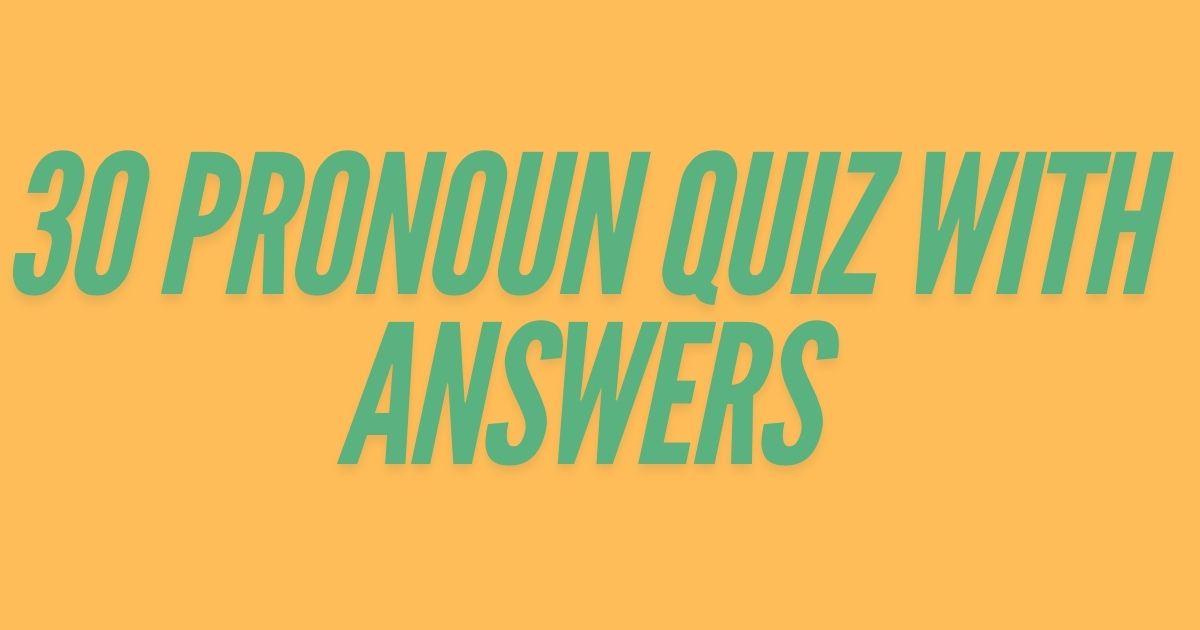Ever caught yourself in a “who” vs. “whom” pickle? Don’t sweat it! You’re not alone in the wild world of pronouns.
These little words pack a big punch in our daily chats, tweets, and even those important emails to the boss.
So, buckle up, grammar enthusiasts! We’re diving into a 30-question pronoun extravaganza that’ll turn you into a pronoun pro faster than you can say “myself and I”… oops, I mean “I”!
Why Mastering Pronouns Is Your Secret Weapon
Picture this: You’re at a fancy dinner, rubbing elbows with the bigwigs, when suddenly you’re asked to introduce yourself and your partner.
Do you confidently say, “This is she and I,” or do you mumble something about “her and me” while reaching for another bread roll?
Proper pronoun usage can be your ticket to sounding sharp and professional, whether you’re chatting with friends or giving a presentation to the board.
Remember the time when a certain pop star tweeted about “her and I” going on tour? The grammar police had a field day! But let’s be real – pronouns can trip up even the best of us.
That’s why we’re here to help you nail these tricky little words and boost your communication skills to the next level.
Before We Dive In: Pronoun Basics 101
So, what exactly is a pronoun? Think of it as a word that steps in for a noun, like a understudy in a play.
Instead of saying “John went to the store, and John bought milk,” we can simply say “John went to the store, and he bought milk.”
See how that pronoun “he” just made our sentence smoother than a fresh jar of Skippy?
Now, let’s take a quick tour of the pronoun family tree. We’ve got personal pronouns like “I,” “you,” and “they” doing the heavy lifting in most sentences.
Then there are possessive pronouns like “my,” “your,” and “their” showing ownership.
Don’t forget about those handy reflexive pronouns like “myself” and “yourself” when we’re talking about actions that bounce back to the subject.
And we can’t overlook demonstrative pronouns like “this” and “that,” interrogative pronouns like “who” and “what” for asking questions, relative pronouns like “which” and “that” for connecting clauses, and those wildcards known as indefinite pronouns like “anyone” and “everyone.“
Whew! That’s a lot of pronouns to keep track of. But don’t worry – our quiz will help you master them all, one question at a time.
Ready, Set, Quiz! 30 Pronoun Challenges to Tackle
Alright, grammar gladiators, it’s time to put your pronoun prowess to the test! Here’s how this is going to work:
We’ve got 30 questions covering all types of pronouns. Try to answer each one before peeking at the explanation. It’s like a workout for your brain – no pain, no gain!
Let’s kick things off with some personal pronoun puzzlers:
- “Between you and (I/me), I think the cake is a little dry.”
- “Who wants to go to the movies with (we/us) tonight?”
- “(He/Him) and (I/me) have been friends since kindergarten.”
Feeling confident? Let’s up the ante with some possessive pronoun posers:
- “Is this (your/yours) book or (her/hers)?”
- “The decision is (their/theirs) to make, not (our/ours).”
Now, let’s flex those reflexive pronoun muscles:
- “She made (herself/herself’s) a sandwich for lunch.”
- “We painted the house (ourselves/our self) to save money.”
Time for some demonstrative and interrogative pronoun teasers:
- “(This/These) apples are ripe, but (that/those) ones need more time.”
- “(Who’s/Whose) turn is it to take out the trash?”
And finally, let’s wrap up with some relative and indefinite pronoun brain-twisters:
- “The book (that/which) I’m reading is fascinating.”
- “(Everyone/Every one) of the students passed the exam.”
Phew! How’d you do? Don’t worry if you’re feeling a bit wobbly – we’re about to break it all down for you.
The Big Reveal: Answers and Explanations
Let’s dive into those tricky questions and unravel the pronoun mysteries together. For question 1, the correct answer is “Between you and me.”
Why? Because “between” is a preposition, and pronouns following prepositions should be in the objective case. It’s a common mistake to use “I” here, but think of it this way: you wouldn’t say “between I,” right?
Moving on to question 16, “She made herself a sandwich” is the winner. Reflexive pronouns like “herself” are used when the subject and object of a sentence are the same person. There’s no such thing as “herself’s” – that’s just asking for trouble!
And what about that head-scratcher in question 26? “The book that I’m reading is fascinating” takes the cake.
In this case, “that” is introducing a restrictive clause, which is essential to the meaning of the sentence. If you could remove the clause without changing the core meaning, you’d use “which” instead.
Remember, mastering pronouns is all about practice and understanding the context. Keep an eye out for tricky situations like pronouns after prepositions, subject-verb agreement with indefinite pronouns, and those pesky who/whom scenarios.
Leveling Up: Pronoun Pro Tips
Now that we’ve covered the basics, let’s tackle some advanced pronoun topics that even grammar gurus sometimes grapple with. The “who” vs. “whom” showdown has been known to cause cold sweats in English classes across the nation.
Here’s a nifty trick: if you can answer the question with “him,” use “whom.” If “he” fits, go with “who.” For example:
- Who/Whom should I invite to the party? (I should invite him. Therefore, use “whom.”)
- Who/Whom do you think will win the election? (He will win. Therefore, use “who.”)
Another hot topic in the pronoun world is using “they” as a singular pronoun. It’s becoming increasingly common and accepted as a gender-neutral option. For instance: “If anyone needs extra help, they should stay after class.”
This usage can help you avoid awkward “he or she” constructions and promotes inclusivity.
Lastly, let’s talk about pronoun-antecedent agreement – the golden rule of pronoun usage. Your pronouns should always agree in number and gender with the nouns they’re replacing. For example:
“Each student must bring their own lunch.” (Correct: “their” agrees with the singular “each student“) “The team celebrated its victory.” (Correct: “its” agrees with the singular collective noun “team“)
Put Your Skills to the Test: Real-World Pronoun Challenges
Now that you’re armed with pronoun knowledge, let’s see how you fare with some real-world examples. Can you spot the pronoun errors in this paragraph?
“Me and my friend went to the store, where we saw a sign that said ‘All customers must present their ID’s.’ We looked at each other, confused about it’s meaning. Who’s ID did they want? Ourselves weren’t sure, so we asked the cashier, which was very helpful.”
How many errors did you catch? From the incorrect “Me and my friend” (should be “My friend and I“) to the misused possessive “it’s” (should be “its”) and the awkward “ourselves” (should be “we”), this paragraph is a pronoun minefield!
FAQs About Pronouns
Q: Is it ever okay to use “they” for a single person?
Absolutely! Using “they” as a singular pronoun is becoming widely accepted, especially when gender is unknown or non-binary.
How do I choose between “who” and “whom” in formal writing?
In formal settings, “who” is used for the subject of a sentence, while “whom” is used for the object. When in doubt, try replacing it with “he/him” – if “him” works, use “whom.”
Q: Are there any pronouns I should avoid in professional writing?
It’s best to limit the use of informal pronouns like “you guys” or “y’all” in professional contexts. Stick to more neutral options like “everyone” or “team.”
There you have it, folks – a deep dive into the world of pronouns! Remember, mastering these little words can make a big difference in how you communicate. Whether you’re a student aiming to ace your English exams or a professional looking to polish your writing skills, pronouns are your friends. So keep practicing, stay curious, and don’t be afraid to get your grammar game on!
Why not challenge yourself to spot pronouns in your favorite book or try explaining a tricky pronoun rule to a friend? After all, the best way to learn is by doing. And hey, if you ever find yourself in a pronoun pickle, just remember – even the pros sometimes pause to ponder their pronouns!
So, how did you do on our 30 Pronoun Quiz? S
hare your score in the comments and let us know which questions tripped you up. Together, we can conquer the grammar galaxy, one pronoun at a time!
More Blog:

Agnes Ava is a passionate English Grammar enthusiast, helping learners Master Language rules and nuances through clear, Engaging Guidance.
